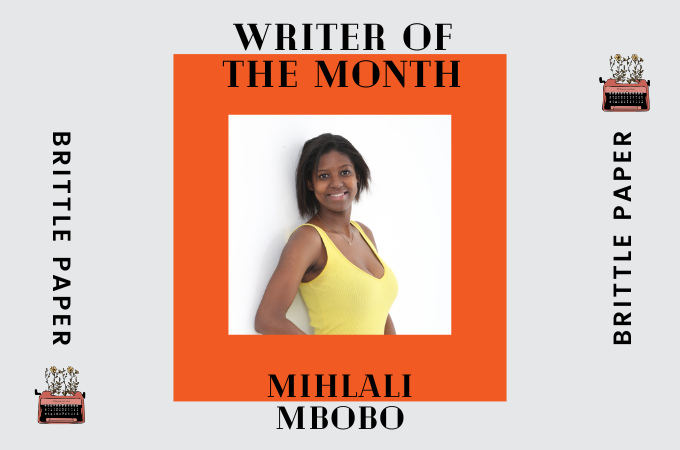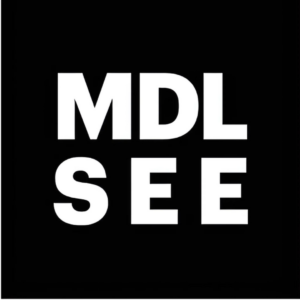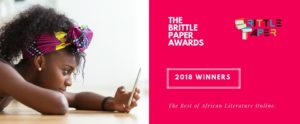
Brittle Paper’s Writer of the Month for July is Mihlali Mbobo!
Mihali is a writer who is interested in the often unshared emotions of our internal lives and the slice-of-life complexities of modern living. Her writing has grown more mature from 32 years of living and learning about the world and herself, so she is currently enjoying this phase of her development. Influencing her writing are her favourite authors, Arundhati Roy, Alain de Botton, and NoViolet Bulawayo. Her short story, “No Water For Lemonade” has been longlisted by Ibua Journal, and she has published work on many social media and literary platforms. Look out for her “AI vs. Human Creativity” essay in Brittle Paper’s upcoming AI Anthology.
With her days often spent thinking up plot twists and epic adventures, we’ve asked her to spare a few minutes for a little chat.
Brittle Paper
Mihlali, congratulations on being our July Writer of the Month! Your piece “The Dying Light” is such a strikingly beautiful story. Every time I read it, it still draws me in and every emotion I felt the first time I read it, I still feel. It’s written so fantastically. We’ll get a chance to discuss it a bit more later but for now, let’s talk about Mihlali Mbobo.
What is your origin story and how did it lead to being a writer?
Mihlali Mbobo
As the introverted child of educators, I think reading and learning were introduced to me at a young age, and I just fell in love with books and stories. The more you love something, the more you want to be engaged with it and create it yourself and that is what literature and writing is to me. The world of words is home for me, it’s the form of expression I am most comfortable and free in, so I end up exploring a lot of ideas and emotions that way.
Brittle Paper
This is by far the most relatable response I’ve gotten. As the introverted child in my family, I’ve also found the world of books and stories to be a comforting space to find and express myself.
There are some questions I ask every WotM because I think it’s quite telling of their character as a writer and creator. Firstly, what is your favourite book of all time? Or top three if you cannot decide.
Mihlali Mbobo
Choosing one is impossible. Today my Top 3 will be The God of Small Things by Arundhati Roy, The Picture of Dorian Gray by Oscar Wilde, and the beloved tween classic Sooner or Later by Bruce and Carole Hart.
Brittle Paper
That’s quite the interesting mini-collection.
You have a podcast called The Mindful & Messy Podcast which we will discuss shortly, but are there any podcasts you are an avid fan of?
Mihlali Mbobo
This is bad but sometime last year I just got over listening to podcasts, I prefer to get the transcript and read the conversation or some sort of summary of the topic/discussion. My attention span is truly short because I just can’t focus long enough to get into listening, so I’ve been on a break from podcasts lately.
Brittle Paper
Honestly, same here. I can read an interview or a transcript of a conversation but having to tune into a podcast and have that be my sole or main focus, I find that incredibly hard.
If you could have a dinner party with your favourite artists, who would they be?
Mihlali Mbobo
Arundhati Roy (writer and activist), Lee Namyeon (musician/composer), and Maria Popova (writer and cultural critic)
Brittle Paper
That dinner party is probably the classiest guest list we’ve gotten so far [laughs].
Now, as I mentioned, you have a podcast of your own. What exactly is The Mindful & Messy Podcast and what led to you wanting to create it?
Mihlali Mbobo
The podcast was actually my 30th birthday gift to myself, I wanted to take the leap and create something personal. The Mindful & Messy Podcast came out of the introspection and life-changing realisations a lot of us were experiencing during the pandemic lockdown of 2020 and 2021. I wanted to share what I was learning and processing, curious to know how others were feeling and what the experience was like for them, and hoping by opening up that they too would be inspired to ask themselves and their loved ones those questions and have those discussions about their everyday lives and mental health.
Brittle Paper
The podcast’s contributing importance aside, I think it’s even more wonderful now knowing this was a gift to yourself. To take a chance on something like this can often be daunting and the process of doing it can often take away the initial joy one had in embarking on it. But to do it as a gift to yourself is a good way of centring and grounding the project in a meaningful way.
During the podcast episodes, you and your guests have touched on topics relatable to most, if not all, people, including grief, perfectionism, and experiences of close relationships during the pandemic. I personally feel these are topics that are natural to discuss but it’s different when you’re not sitting in your kitchen discussing it with a friend and instead, you’re miked up talking about it as a professional interviewer/podcaster. How did you find navigating these types of conversations?
Mihlali Mbobo
Most of the topics and discussions for the episodes came from exactly those after-dinner, kitchen table conversations where you unexpectedly get deep and realise some major things about yourself and the ways you relate to people and the world around you. I’m fortunate to have mature and emotionally present people in my life that have helped me grow and heal through such open, honest, and supportive conversations and I wanted other people to have something like that. I would script some parts of the show, flesh out the topics beforehand so I was sharing my story but also information and perspectives I felt were balanced and helpful to listeners. It was strange at first but after a while, I had an imaginary listener in mind as I recorded, so it was easy because the conversation is how I would actually speak directly to someone in front of me. It was different but not as difficult as it may seem.
Brittle Paper
If some of our readers, especially the writers, haven’t yet heard your podcast, I think they would greatly appreciate it because you talk about topics that they touch on a lot when I read their work.
Now, your June piece, “The Dying Light,” allows us to observe and, quite possibly, resonate with the protagonist, Siphiwo. The beginning felt very relatable because if you are a poc in Cape Town, especially, you’ve had these encounters throughout your life, whether it be in a professional or just social setting. But then we follow Siphiwo down this slow-burn journey into the mind and feelings of someone battling depression. This entire journey is done so unbelievably well. I don’t actually have a question here, I would just very much like for you to talk about your thoughts and reasons for creating this stunning piece.
Mihlali Mbobo
I’ve had my own battles with Depression and Anxiety, as have many people but that’s not something we speak about enough. We get up and go to our jobs, smile at our colleagues and loved ones, all the while dying inside from stress, anxiety, insecurity, trauma and all sorts of things. We’re often ill-equipped to process and handle these things on top of the everyday challenges of existing under Capitalism and all the other isms of our society. Living can be incredibly suffocating and that feeling of being overwhelmed, of burnout, and of depression, it’s a response to very real stressors and events and not something to be ashamed of. Sometimes it’s enough to say ‘I hear you’ or ‘I feel that way too’ without providing further comment or solutions, that is what “The Dying Light” was about. Just to say there’s this guy Siphiwo out there working hard and trying to keep his inner world above water even though he looks okay on the outside. We are made of flesh and blood and emotions, and I want to contribute to a world where we embrace and share that with each other more.
Brittle Paper
There are fragments that together sum up what I took to be the core of the story and that is:
Maybe if things were completely hopeless, it would have been easier to accept, but it was the little daily hopes that killed him. The thought that maybe today will be different, today will be the breakthrough […] It’s not so much that he wanted to die as that he didn’t know how to continue living. The reasons everyone else seemed to live for felt meaningless and out of reach for him […] He could be free in a matter of moments if he chose to, but he didn’t want it to be his choice – why couldn’t the heavens take pity on him and have fatal calamity befall him? Then he could die with sympathy and dignity instead of sadness and confusion.
These parts really stuck with me and not particularly because I related to it to the extent that Siphiwo did but because it felt like the most apt and almost tangible description of how depression feels. It gave words to something I could never really describe before, and I’m sure many who read this story feel that way. Since publishing this story, have you had anyone reach out to say that your story made them feel seen?
Mihlali Mbobo
I had some people share that the story resonated deeply with them, and I was glad because that was the point I was trying to make, that these messy, dark thoughts and emotions you could be having on a Tuesday afternoon are not so crazy and abnormal after all. The state of the world means we have a lot of things to worry about, for the first time in my life the future feels uncertain in a scary and dangerous way and we can’t pause the game or get off this train – we have to live through the changing of the world, whether it be good or bad and I think that experience is what a lot of us are struggling to contend with and articulate.
Brittle Paper
I don’t want to probe further on this topic because the new work being published on Friday will be a continuation of “The Dying Light.” I don’t want to spoil the story but what can you tell us about the next instalment?
Mihlali Mbobo
The overall feedback from “The Dying Light” were questions about what happened next with Siphiwo. So, I’m happy to have readers invested in this character and maybe I’ll share more of his story.
Brittle Paper
I always end with the same question so, apart from your writing, Mihlali, what is one thing about yourself that you want to share with our readers?
Mihlali Mbobo
I never know how to respond to these. I’m just a girl with a lot of racing thoughts and big feelings and I’ve found it helps to write them out. My favourite gift of living is getting to experience, savour and share things. The big things, little things and the silly things that happen to us – I want everyone reading this to randomly call or text someone they love and share something devastatingly deep and stunningly silly just for kicks.
Brittle Paper
Mihlali, thank you for being the July Writer of the Month, but mainly thank you for this incredibly wholesome and almost therapy-like interview [laughs]. It’s been an absolute pleasure speaking to you.
For more of Mihlali’s work, be sure to check back in on Friday, and for more interviews with our writers, check out our last month’s with Kikachi Memeh here.








COMMENTS -
Reader Interactions